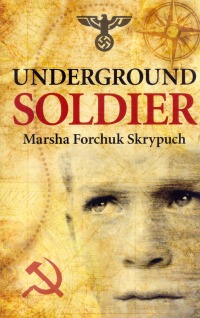| ________________
CM . . .
. Volume XX Number 35. . . .May 9, 2014
excerpt:
With this daring leap of faith, hope, and luck, Luka Barukovich escapes the work camp to which he and his dear friend Lida Ferezuk had been consigned. Unlike her sister, Nadia (whose real name is Larissa and whose blue eyes and blonde hair made her look Germanic enough to be considered “Lebensborn” and thus, fit for placement with a German family), Lida became an “Ostarbeiter”, a forced labour worker who assembled bombs and their components. Nadia’s story is told in Stolen Child, and Making Bombs for Hitler tells of Lida’s experiences. In Underground Soldier, Marsha Forchuk Skrypuch provides another perspective, that of a 13-year-old who escapes the same camp in which Lida has been enslaved. Luka’s father was a pharmacist in Ukraine’s capital city of Kyiv. He and his parents had a comfortable life, but the war changed everything. Denounced by a neighbor as a “Nazi spy”, Luka’s Tato (Dad) is arrested by the NKVD (the Soviet secret police) and paraded “through the streets as a traitor. And then Tato disappears . . . .” (p. 9) As occurred to many of his contemporaries, Luka’s childhood ends. Luka and his mother suffer the deprivations of wartime, his best friend, David Kagan, is a victim of the massacre of Jews at Babyn Yar, and the historic beauty of his hometown is destroyed. After his escape, Luka lives and survives by his wits, and when he falls victim to accident or injury, his father’s knowledge of both traditional and current pharmaceutical knowledge enables him to keep going. He is buoyed by his father’s confidence that ‘[he has] the tools to heal himself” (p. 7), and his fondness for Lida, who, despite everything, has “this gift . . of finding goodness in even the worst situations.” (p. 48) Although Luka feels guilty at having left Lida behind at the camp, he is driven by the hope that he will find his father, and so he heads for the Carpathian mountains. Along the way, he encounters another young escapee. Martina Chalupa is Czech and worked on a farm, but now, like Luka, she is on the run, seeking to find a place that is safe and away from the war. They continue their travels together, eluding German soldiers, and seeing other escapees from the camps. “Young people wearing homespun clothing would pass by too. It was as if the entire world had decided to escape to the mountains.” (p. 98) One night, while trying to cross a river, they are stopped in their tracks. Certain that the Nazis have trapped them, they awaken to find themselves in an underground field hospital, and it is here that Luka’s life takes a turn. He realizes that he “couldn’t get to [his father right now, and . . . couldn’t help Lida or [his] mother. But [he] could fight for freedom.” (p. 111) So it is that, in 1943, Luka Barukovich becomes an underground soldier, a member of Ukrainian Insurgent Army (also called the UPA), fighting against the Nazis and the Soviets. It’s not easy being a soldier, and even less so when one is a child soldier. By the time the war ends, Luka has seen death, killed, and witnessed horrors. While there are surprising acts of kindness and humanity by individuals on all sides of the conflict, by war’s end, everyone is desperate for food, for home, for security. Luka finds himself in a camp for displaced persons, and like all those who have been displaced, he continues the hunt for his family and, most importantly, for Lida. Is there a happy ending for Luka? Well, he does find Lida, but as for his father and the rest of the family? They are among the many who disappear, known only as statistics of wartime tragedy. Underground Soldier is a swift-moving book, and I think that young male readers will really enjoy Luka’s story. They might find his affection for Lida a bit “mushy”, but the adventure of living on the run and Luka’s involvement with the UPA will more than compensate. The book also provides the story of an insurgent group, perhaps not well-known, even to those who consider themselves well-schooled in the events of World War II. In her “Author’s Note”, Marsha Skrypuch tells of her meeting with Peter J. Potichnyj, Professor Emeritus of Political Science at McMaster University. Like Luka, he joined the UPA when he was 14, and he has continued to collect primary documents and memoirs in order to detail the UPA’s history. Skrypuch dedicates the book to him, and indeed, the story stands as witness to all those children and young adults who suffered in eastern Europe, regardless of their ethnicity or religion. Underground Soldier is also a worthy choice as supplementary reading for classes studying The Diary of Anne Frank, and it is an excellent addition to school library collections. It is definitely accessible reading to middle school readers, and I think that high school students will enjoy it as well. Highly Recommended. Joanne Peters, a retired high school teacher-librarian, lives in Winnipeg, MB.
To comment
on this title or this review, send mail to cm@umanitoba.ca.
Copyright © the Manitoba Library Association. Reproduction for personal
use is permitted only if this copyright notice is maintained. Any
other reproduction is prohibited without permission.
NEXT REVIEW |
TABLE OF CONTENTS FOR THIS ISSUE
- May 9, 2014.
AUTHORS |
TITLES |
MEDIA REVIEWS |
PROFILES |
BACK ISSUES |
SEARCH |
CMARCHIVE |
HOME |
